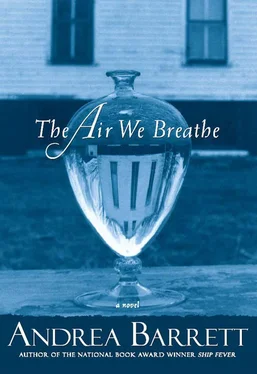What I am trying to do is modest but I know it’s right — if they return to society better fitted to be happy and productive workers, the sort we would be pleased to hire, I will feel most satisfied. I am with Taylor in his philosophy of management: “Men, not materials, are the finished product of a factory.”
And not only men: women as well. I did something bold this week, Edward. Attendance at the second and third sessions dropped a bit, and so I asked the housekeeper’s daughter, the one who’s been driving me, to join our group formally. Also I asked a friend of hers, a ward maid who’d come by to see her and stayed to listen. Both have agreed, which pleases me. I think I’ll issue a general invitation to the women’s annex, to make the group truly coeducational. The men and women are kept largely separate, meeting only for meals, prayers, or the occasional moving-picture show. They should welcome this chance for further interaction.
In your last, you said nothing of Lawrence — I worry about him all the time. I haven’t had a letter from him in a month, have you? Often at night I have trouble sleeping (so would you, if you spent half of each day lying about) and then I see our trip again in my memory. I remember the way we grew so thirsty, after working in the rocks all day, that when we got back to the boat in the evening we dropped our heads to the river and drank like horses: you and me and Lawrence side by side. I remember the little boy who told us the Sioux legend about the giant monsters who’d once roamed the land, and how the Great Spirit struck them down with lightning bolts. Their explanation for dinosaur fossils, both of us realized at once. When the little boy said that the bones still lay on the ground where they fell, as no Sioux would touch them for fear they might be similarly destroyed, Laurence said: “ I will touch them!” Brave boy. Where did all of that go?
There is little news; my health is much as it has been, neither worse nor, unfortunately, any better. Write when you can, your letters cheer me greatly.
EACH WEDNESDAY MILES continued to make the drive between the village and Tamarack State, puzzled that he hadn’t drawn more of us in but sure that he’d succeed in time and comforted by the presence of Naomi at his side. The two women he’d courted seriously in the past had been ample and tall, while Naomi was as small as a child: the top of her head barely reached his nose and her figure was very slight. Sitting close to her in the car, though, always aware that she’d approached him, he saw that he’d missed the beauty of her eyes, her fine skin, and her wide, mobile mouth. Nor had he noticed, before, how sharply she observed those around her. On their rides, as she navigated the bumps and turns or steered around a frightened rabbit, she had something to say about all the other boarders at her mother’s house. This one looked worried, those two had quarreled, that one’s cough had changed. What, he wondered, did she say about him? Imagining her talking to Eudora, he began on Wednesdays to dress more carefully, tending to his fingernails and smoothing lotion on his hands.
One afternoon, aware of her perched on the window seat as he listed geological periods, Permian, Devonian, Carboniferous, he stopped mid-sentence and started talking, instead, about how each of us possessed at least one gift. No matter how poorly we’d been educated, no matter how deprived our lives, we each had something worthy of sharing. “That’s why I started these sessions,” he said, walking toward the window. “I believe that absolutely. Look—”
Swiftly he bent down, tugged away from Naomi the tablet of drawing paper she always had with her, and on which we’d seen her sketch our surroundings and sometimes our faces, and held it up. Leo and Ephraim side by side, an excellent likeness of both.
“A perfect example,” Miles said. “Naomi’s gift, one of Naomi’s gifts, is the way she can draw anything.”
She frowned and took the tablet back, flipping the pages to a drawing of roosting crows and wondering what else he thought he knew about her. He was studying her, she thought. As if she were a rock formation hiding a big skull. All month she’d felt his gaze following her as she dropped off laundry or picked up his library list, and often, now, despite the months when she’d been invisible to him, he looked at her intently and wanted to talk. His glances had prickled her skin as she sketched and she was almost sure he’d been eavesdropping on her and Eudora earlier, in the hall. She should have asked him for work simply, bluntly, instead of trying to charm him — why had she done that? On their last few drives she’d spoken little and answered his questions tersely, trying to act more like an employee than a companion, but he’d sensed nothing. Oblivious, like all the antiques: her mother, Eudora’s parents, Mr. Baum who sold her fabric and buttons, the fat geese who ran the village with their swollen middles and scrawny necks. All of them sure they knew how the world worked, unaware that their advice was useless and that they had nothing to say to her. What did they know about what she felt, what she needed, how the world was shimmering beyond these mountains, waiting for her to grasp it? They’d forgotten everything important about being alive.
“And so,” Miles was saying, having swerved back to his original subject, “when you consider the comparative paucity of the fossil record…”
Arrayed before him, we looked up obediently: more geese, Naomi thought. But we weren’t as stupid as she believed. We were people trying to learn something in a situation that offered little else, and at a time when we needed the distraction. That November, while Naomi was already trying to undo what she’d set in motion, also brought President Wilson’s reelection. Despite his campaign promises, no one really believed he’d be able to keep us out of the war much longer. November was the news from France, the battles at Verdun and the Somme just grinding to their end. It was rain and a new cook in the kitchen and two orderlies leaving; it was Morris and Pinkie back in the infirmary and Sam — age twenty-six, beloved first of Pearl and then of Celia — dead. November was the sky dropping down over our mountains like the lid of a cooking pot, until even the description of a three-horned herbivore was more pleasant than our own thoughts.
A shifting group of us kept showing up for the sessions with Miles, but each week we managed to stretch the length of our refreshment break a little further, taking pleasure in talking, then, about whatever we wanted. One afternoon Ian, who roomed a few doors down from Leo and Ephraim, looked around at those of us holding cups of hot chocolate and slices of bread and butter topped with jam, and started talking about his brother, who had a wonderful job making children’s toys. For three years, he explained, his brother had worked at the plant that produced Erector sets, stamping steel into miniature girders, each tiny element precisely made and glowing with its nickel coating, the girders fitting so neatly together that a boy might construct a miniature bridge or a battleship. Instead of working as a collier, as he’d have been doing if he’d stayed in Wales, he was aboveground, not black with coal dust, enjoying the routine of a well-run factory.
“I run an excellent factory myself,” Miles said, leaning into our circle. “At my plant…”
Ian smiled, nodded, and then, as if Miles hadn’t spoken, continued. “I was hoping to work there myself, before I got sick,” he said. “My brother was sure he could get me a job.”
“You’d be right to leap at that,” Leo said.
Читать дальше












